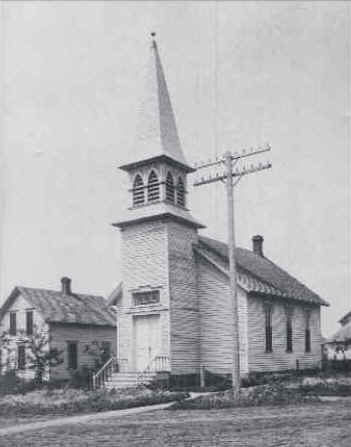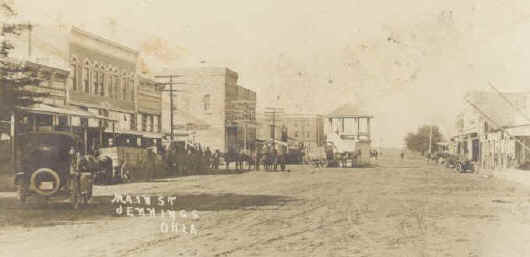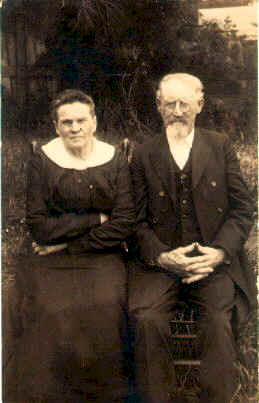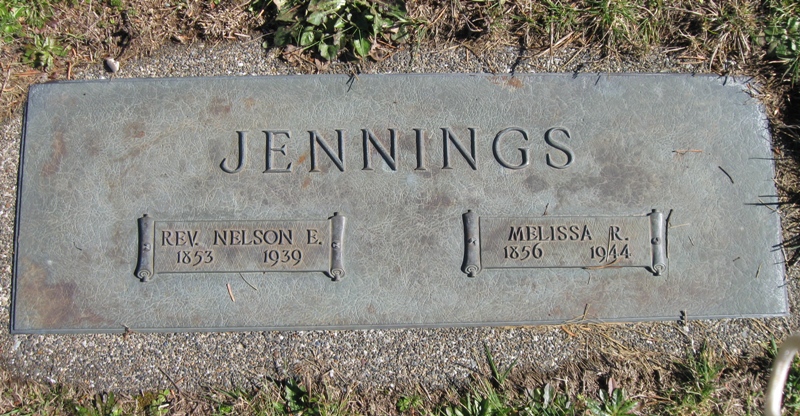Great-2 Grandfather Nelson Everett Jennings (Nov. 29, 1852 - Jan. 6, 1939) and his wife Melissa Rachel Luke (Oct. 4, 1856 - Mar. 12, 1944) grew up in rural Wisconsin. There are few verbal family tales about them, but distant relatives assembled information about their lives at a website called: "Reverend Nelson Everett Jennings Diary Project 1877 to 1936." Nelson kept a daily diary most of his life and his daughter Bertha and others placed it on-line. That website disappeared in 2007, but thanks to the Wayback archive I was able to retrieve some information. There is more that can be read at this link. This love letter is interesting:
elissa Luke letter to Nelson,
1875
|
They married in the small town of Vernon in southern Wisconsin on July 11, 1875 and had a total of 12 children, although not all lived to adulthood. Family tales are that Nelson went to Iowa for Methodist clergy training. Christian groups in New England donated funds to civilize the American frontier. In the 1850s they focused on preventing slavery from expanding to new states like Kansas. After the Civil War, they shifted attention to saving the heathen American Indians and bringing the word of God to isolated settlers on the American frontier.
Most preaching was done by "circuit
riders" who traveled between small, remote settlements. They were
called circuit riders or saddlebag preachers since they traveled with
only what could fit
in their saddlebags. They rode through wilderness to preach at any place available
(cabins, courthouses, fields,
meeting houses, basements, and street corners). Many circuits were so
large that it would take six weeks to cover them. The ministerial activity of
the circuit riders boosted Methodism into the largest Protestant denomination
at the time. By 1839, the denomination had grown to 749,216 members served by 3,557 traveling
preachers and 5,856 local preachers. The
Methodist preachers were organized into conferences, each headed by a
bishop. 
Nelson Jennings' training and work was sponsored by the Wesleyan Methodists. (John Wesley was the founder of the Methodist Church.) That organization provided a distant relative with this summary of Nelson's career:
N. E. Jennings and his ministerial appointments in The Wesleyan Methodist Connection of America.
Wisconsin Conference
- Pastor Sandusky, WI 1876-1877
- Pastor Oaks Circuit, WI 1877-1878
- To seek his own fields, at his request 1878-1879
- Letter of standing. 1879-1880 (This meant that he was in good standing leaving the Wisconsin Conference.)
Dakota Conference
- Pastor Avon/Aden Circuit, SD 1880-1885
- Pastor Bushnell, SD 1885-1888
- Pastor Pryor, SD 1888-1889
- Pastor Troy, SD 1888-1889
- Pastor Avon/Aden Circuit 1889-1892
- Evangelist and Conference Missionary 1893-1894
- Missionary in Missouri 1894-1895
- Dismissed by letter October 21, 1896 (This meant that he was still in good standing but was leaving the Wesleyan Methodist.)
Wayne Keller
Assistant Director
The Wesleyan Archives
Children Lattie, Clara, Frances, and Milton were born in Wisconsin. In 1880 the Jennings moved to the Dakota Territory along with Melissa's parents and brother. They were attracted to the cheap farmland opened by the federal government and obtained free land by homesteading. Nelson got 158 acres in 1888. They preached and farmed near the small town of Avon where Francis, Charles, Nathan, and Mary were born.
According the official
history of Avon, South Dakota: 
"The Avon Wesleyan Church was organized in 1880 with nine charter members: Mary A. Baker, Lois Baker, N. E. Jennings, M. R. Jennings, Isaac Luke, Rebecca Luke, Alonzo Luke, Howard Wichersham, and Isa Wichersham. Reverend N. E. Jennings came as the first pastor, when services began in June of 1880, at an annual salary of $17, raised to $107.67 by 1885. Church membership grew to 60 by 1892. The original structure was a sod house, located one and a half miles south and one mile east of Avon. In 1885 Freeman and Mary Hayward donated land one and a half miles south of town, where Wesleyans constructed a frame church with a value of $800. (pictured) Subsequently the congregation purchased two lots in the city of Avon, and in 1901 moved their church building from the Hayward property to its present site.
The first trustees were Lewis Baker, Isaac Luke, and Alonzo Luke, elected in 1882. Howard Wickersham and Charles Hayward were the first persons to receive Exhorter’s licenses. Their role was to earnestly exhort others to listen to the word of God, and to examine their personal commitments to the faith."
Note that Isaac and Rebecca Luke were Melissa (M.R.) Jennings' parents, and Alonzo was her brother. Nelson's annual salary was very low, but preachers usually collected suggested "donations" for conducting marriages and funerals. The church included a "parsonage" i.e. house (pictured) next to the church where Nelson and his family probably lived. During the 1970s, this house was preserved and exhibited as the home of presidential candidate Senator George McGovern, whose father was a pastor there in the 1920s. After his defeat in 1972 it was moved to another location, and later destroyed.
 The
Methodist clergy were required move to another position every couple years,
probably to share the difficult job of circuit riding. In 1894, the Jennings
family was transferred to Missouri where sons Joseph and Joshua “Paul” were
born in Lamar. In
1896, Nelson
left the Wesleyan Methodists at age 48 and moved to Oklahoma where their last child Bertha was born.
The
Methodist clergy were required move to another position every couple years,
probably to share the difficult job of circuit riding. In 1894, the Jennings
family was transferred to Missouri where sons Joseph and Joshua “Paul” were
born in Lamar. In
1896, Nelson
left the Wesleyan Methodists at age 48 and moved to Oklahoma where their last child Bertha was born.
They farmed near the small town of Jennings, Oklahoma (pictured) near Pawnee where Nelson also preached. The town grew rapidly during the oil boom, but is now mostly abandoned. In Oklahoma Place Names, historian George H. Shirk asserts that this new town was named in honor of town site developer George Jennings. However, it is also believed that it was named for frontier lawyer turned outlaw Alphonzo "Al" Jennings, who donated forty acres for the 160-acre town site. Nelson may have been related to one of these Jennings, which prompted his move to Oklahoma to join the land rush. From the Diary project mentioned above, here is a sample from June 1900 in Nelson's own handwriting that notes a trip to Jennings.

 Most of the Jennings
children matured and married in Oklahoma. Two sons, Charles and Milton, married
two daughters of a Methodist preacher in nearby Pawnee named Charles McIntosh.
Charles (aka C.O.) Jennings was my great grandfather and a Methodist circuit
rider like his father. After a decade of stormy marriage, C.O. left his
wife and family and moved to Vancouver, Washington where his Uncle Orville and
Aunt
Mary lived. Family tales are that C.O. was unfaithful and had wives and
children throughout the Midwest.
Most of the Jennings
children matured and married in Oklahoma. Two sons, Charles and Milton, married
two daughters of a Methodist preacher in nearby Pawnee named Charles McIntosh.
Charles (aka C.O.) Jennings was my great grandfather and a Methodist circuit
rider like his father. After a decade of stormy marriage, C.O. left his
wife and family and moved to Vancouver, Washington where his Uncle Orville and
Aunt
Mary lived. Family tales are that C.O. was unfaithful and had wives and
children throughout the Midwest.
This must of been an extreme embarrassment to his parents Nelson and Melissa, and may be why 62-year old Nelson and Melissa moved to Oregon in 1915. (pictured) They settled near the tiny logging village of Prosper, three miles from the small town of Bandon, Oregon along the southern coast in Coos County. They were accompanied by their teenage children Bertha and Paul. The Homestead Act provided another reason to move as federal records show that Nelson got 120 acres and son Paul got 148 acres of free land. C.O. had moved to Seaside Oregon some 200 miles north of Bandon. The picture below of Nelson and Melissa was taken during a visit there.

Son Paul lived with his parents in their old age. Nelson lived to age 86 and died January 7, 1939 while Melissa lived to age 87 and died March 12, 1944. Her obituary noted that she outlived six of her twelve children, and listed the six living: Mrs. May Durphey, in Elkpoint, South Dakota; Frank, in Bremerton, Washington; C. O. in Seaside; N. A. in Napa, California; Mrs. Bertha Thomas in Seattle; and Paul, in Bandon. Great Grandparents-2 Nelson and Melissa Jennings are buried at the IOOF Cemetery in Bandon, Oregon.
